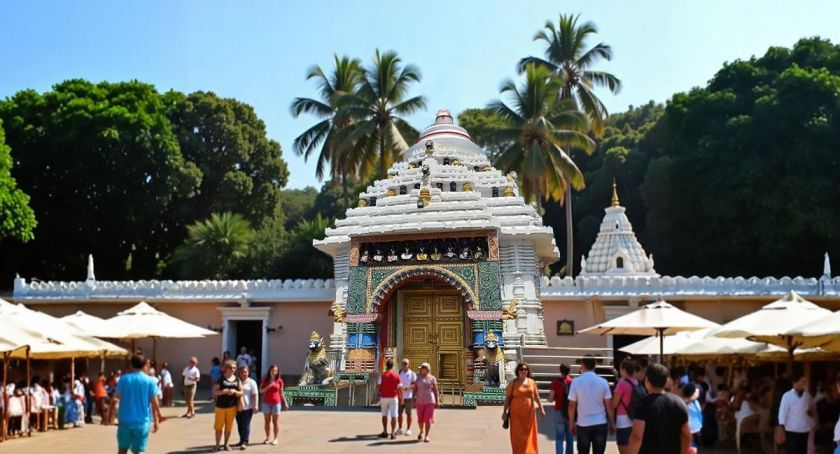Mausi Maa Temple in Puri, Odisha
“A Temple Rooted in Love and Legend”
India, a land of profound spirituality, is adorned with temples that tell tales of devotion, heritage, and divine connections. The Mausi Maa Temple in Puri, Odisha, holds a unique place in the hearts of devotees. “Mausi Maa translates to Maternal Aunt Mother, representing the affectionate relationship between the temple’s deity and Lord Jagannath.
Situated along Puri’s Grand Road (Bada Danda), this temple plays a crucial role in the renowned Rath Yatra festival. Dedicated to Goddess Ardhasini, believed to be Lord Jagannath’s maternal aunt, this sacred site is deeply tied to divine protection and an extraordinary legend—her act of swallowing floodwaters to shield Puri from devastation.
A Story of Divine Protection & Sacrifice: Mausi Maa Temple
The spiritual traditions of Puri and the revered Jagannath Temple profoundly shape Mausi Maa Temple’s legacy. According to mythology, the temple’s presiding deity, Goddess Ardhasini, protected Puri from a catastrophic flood by consuming the raging waters. This selfless act established her as a symbol of divine protection, sacrifice, and maternal love.
Her role extends beyond mythology into the grand Rath Yatra festival. During the deities’ return journey (Bahuda Yatra), their chariots stop at Mausi Maa Temple, where they receive Poda Pitha, a sacred offering symbolizing affection and hospitality. This gesture reinforces the temple’s significance in showcasing divine familial bonds. Today, devotees visit Mausi Maa Temple to seek blessings for protection and resilience, embracing the enduring legend of Goddess Ardhasini’s love and guardianship.
An Architectural Jewel on Puri’s Grand Road
Though relatively less grand than the Jagannath Temple, artisans built the Mausi Maa Temple in the traditional Kalinga architectural style. They adorned it with complex carvings, a pyramid-shaped vimana (tower), and a sanctum housing the idol of Goddess Ardhasini.
The temple, located along Puri’s Grand Road (Bada Danda), is a significant stop during the Rath Yatra. Over the years, it has undergone several renovations to preserve its historical essence while remaining accessible to the ever-increasing number of devotees.
A Pivotal Stop in the Grand Rath Yatra
The Rath Yatra, or Chariot Festival, is one of India’s most celebrated Hindu festivals. During the Bahuda Yatra (return journey), the deities’ chariots stop at Mausi Maa Temple, where they receive a unique offering- Poda Pitha.
This traditional sweet dish—made of fermented rice, coconut, and jaggery—symbolizes the love and hospitality of Lord Jagannath’s maternal aunt. This sacred halt reaffirms the significance of maternal blessings before the deities return to their central abode at the Jagannath Temple.
Daily Rituals & Sacred Offeringsaaaaa
Devotion flows endlessly at Mausi Maa Temple, where daily rituals and offerings keep the spiritual energy alive. Some key practices include:
- Daily Aarti & Prayers – Priests perform aarti and recite prayers, invoking Goddess Ardhasini’s blessings for protection and prosperity.
- Poda Pitha Offering – This beloved Odia delicacy, associated with maternal love and divine blessings, is offered regularly by devotees.
- Special Ceremonies During Rath Yatra –The temple hosts grand celebrations when thousands gather to witness the sacred ritual of offering Poda Pitha to the deities.
The Temple’s Profound Spiritual Symbolism
Mausi Maa Temple represents divine protection, maternal love, and spiritual guidance. The legend of Goddess Ardhasini consuming floodwaters highlights sacrifice and care, reinforcing the temple’s deep spiritual symbolism. Devotees visit to seek protection from hardships and to strengthen family bonds. Beyond rituals, the temple serves as a place of faith, where prayers for resilience and well-being resonate. Its sacred presence offers comfort, reminding worshippers of the goddess’s enduring guardianship and the power of devotion in overcoming life’s challenges.
Grand Festivals That Illuminate Mausi Maa Temple
While Rath Yatra is the temple’s most celebrated event, other Hindu festivals bring vibrant devotion and festivities:
- Durga Puja – Devotees beautifully decorate the temple and perform special rituals to honor Goddess Durga, the ultimate divine feminine power.
- Kali Puja – Devotees worship Goddess Kali, seeking strength and protection.
- Kartik Purnima – This sacred day, celebrated with prayers, rituals, and spiritual gatherings, attracts many believers.
Each celebration cements the Mausi Maa Temple as Odisha’s spiritual and cultural cornerstone.
A Pilgrim’s Experience, What to Expect and When to Visit
A visit to Mausi Maa Temple is a unique and enriching experience. Here are some things to expect:
- Serene Atmosphere – The temple’s calm surroundings create peace and devotion, which is ideal for meditation and spiritual reflection.
- Traditional Odia Rituals – Witness priests conducting traditional Odia prayers, hymns, and offerings, adding authenticity to your visit.
- Local Cuisine & Poda Pitha – Don’t miss tasting Poda Pitha, especially during Rath Yatra, when it is abundant.
- Festive Vibrance – If you visit during Rath Yatra, you will experience the colorful chariots, joyous crowds, and melodious chants that define this grand festival.
Why This Sacred Shrine Should Be on Your Travel List
Mausi Maa Temple is not just a place of worship but a symbol of divine affection, sacrifice, and unwavering faith. Its deep-rooted connection to the Jagannath Temple and Rath Yatra makes it an essential landmark in Odisha’s spiritual landscape.
Visiting here offers a soulful experience, allowing devotees to witness and partake in a centuries-old tradition. The bond between Lord Jagannath and his maternal aunt reflects Hinduism’s emphasis on familial love, making this temple a must-visit for devotees and cultural explorers.
So, next time you step into Puri, let Mausi Maa Temple be a part of your journey. Pause for a prayer, accept the temple’s sacred aura, and put yourself in a timeless tradition of faith, protection, and divine love.


